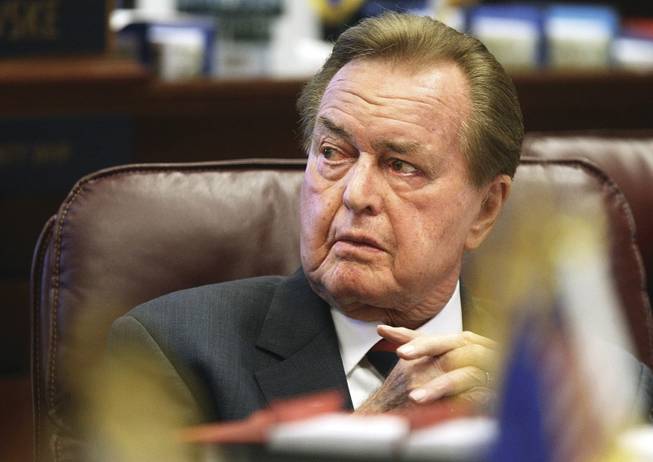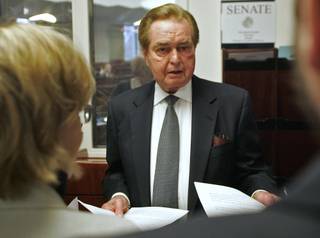
Cathleen Allison / AP
Former state Sen. Bill Raggio, shown here during the 2009 Legislature, died Thursday at age 85 after falling ill while on a trip in Australia with his wife, Dale.
Saturday, Feb. 25, 2012 | 2 a.m.
Legislatures remember Bill Raggio
Face to Face host Jon Ralston interviews Dina Titus and Randolph Townsend on the death of Bill Raggio, Feb. 24, 2012.
Legislators remember Bill Raggio
Face to Face host John Ralston interviews Dina Titus and Randolph Townsend on the death of Bill Raggio, Feb. 24, 2012.
Nevada governors speak on Bill Raggio
Face to Face host Jon Ralston continues interview with two former governors on the death of 85-year-old Bill Raggio, Feb. 24, 2012.
Related stories
- Prominent Nevadans respond to the death of former state Sen. Bill Raggio
- Bill Raggio honored after record 38 years in Nevada Senate
- Bill Raggio: Sunsets on taxes are for a reason
- Raggio's exit leaves a big vacuum
- Raggio void dramatically alters Senate landscape
- State Sen. Bill Raggio to retire before session begins
- State Sen. Bill Raggio bagged by his own party
- Yes, Raggio burned down a Nevada brothel
To say Nevada will never see another politician like Bill Raggio isn’t hyperbole. It’s fact.
By the time Raggio took over as majority leader of the state Senate, in 1987, he had already spent 15 years in the Legislature. Today, because of term limits, lawmakers are out of office after 12 years.
Former state Sen. William John Raggio, Jr., who died Thursday, was one of the last links to a quickly fading era of Nevada governance, one that was more collegial and founded on relationships among legislators that were fostered over the years.
Political campaigns, Raggio was fond of saying, should end when the governing begins.
Raggio said both sides should compromise.
As parties became more hardened in their positions in recent years, reflecting the partisanship in Washington, Raggio mourned the ideological rift between them.
“The process is different from what I experienced over the years,” he told the Las Vegas Sun during the 2011 session. “I wish there was more flexibility, more willingness to work together and compromise. I realize to some factions, either far right or far left, compromise is something they discourage. But to me that’s the essence of the legislative process.”
Armed with a quick wit and charm, Raggio, the longest-serving state senator in Nevada history, fought for state government to be “lean but not mean,” in his words. He died Thursday of a respiratory illness while traveling in Australia. He was 85.
For most of his career, Raggio, a Reno Republican, was the unequaled master of the legislative process, an adviser to governors and protector of Northern Nevada interests against the growing population and power of Las Vegas.
“He always seemed to know what you needed the most,” said former Gov. Bob Miller, a Democrat. “But he was incredible about concealing what he needed the most.”
In the middle of one budget fight, Raggio learned that Miller strongly supported having a science adviser directly reporting to the governor.
“It wasn’t the most consequential thing, but it was the very last thing to get passed,” Miller said. “He knew I couldn’t go home if I couldn’t get that one passed.”
At the same time, he knew how to cooperate and, more important in his view, compromise with his colleagues.
As the biennial legislative sessions would near an end, Raggio and former Assembly Speaker Joe Dini, D-Yerington, would sit down together with a list of bills that they wanted.
“Then we had to convince the other one that they should pass,” said Dini, who served with Raggio for 25 years. “We went back and forth for days until finally we’d get it to one of two issues that had to be decided philosophically. It was a good system, you know, because it was fair.”
While his willingness to compromise gave him negotiating power and a “statesman” reputation, it also made Raggio a target of more conservative Republicans, especially when the deals involved tax increases. He nearly lost his seat in 2008 to former Assemblywoman Sharron Angle, who characterized him as moderate. He won only after spending weekends walking door-to-door in his district and promising he wouldn’t raise taxes.
Raggio bristled when his Republican credentials were called into question. He compared his fights with the no-tax wing of the Republican Party during the 2000s — he said they were closer to libertarians than Republicans — to his fights with the John Birch Society in the 1950s and 1960s, when he was active in Republican politics and a Washoe County district attorney.
He referred to himself as a “traditional Republican” and insisted that he had stayed constant as the party had drifted further to the right. Former governor and U.S. Sen. Paul Laxalt recalled Friday how he and Raggio rebuilt the Nevada Republican Party.
Raggio was a fierce advocate for higher education, and the University of Nevada, Reno, in particular. He pushed for a highway project, involving a series of bridges, between Reno and Carson City. When some suggested that Southern Nevada tax dollars subsidized the north, he shot back that Southern Nevada used a lot more services than the North.
Raggio was born Oct. 30, 1926, “just hours short of Nevada Day,” wrote Michael Archer, in the 2011 Raggio biography “A Man of His Word.”
Raggio served 38 years in the state Senate, retiring abruptly before the 2011 Legislature.
Even in his last session, in 2009, he knew how to rule the game. He appeared to be in a weakened position. State Senate Republicans were in the minority for the first time since 1991 and the Republican governor, Jim Gibbons, was adamantly opposed to any tax increase.
Raggio, however, maneuvered, ultimately allowing him to dictate the terms of what would be the final budget agreement — it included a modest, temporary tax increase to fill holes in a recession-riddled state government. He then got a majority of his Republican Senate colleagues to support it.
When Democratic Senate Majority Leader Steven Horsford pushed Raggio to alter the terms of the deal — seeking higher taxes and that they be made permanent — Raggio didn’t blink. It was Democrats who caved, signing on to Raggio’s deal.
When Republican voters nominated Angle for U.S. Senate the following year, Raggio crossed party lines and “reluctantly” endorsed Harry Reid, arguing that the Democratic senate majority leader would better represent the state than Angle. (A strict adherent to old-fashioned manners, it rankled Raggio that Angle had never called to congratulate him for his win in the 2008 state Senate race.)
After that race, state Senate Republicans ousted Raggio from his post as their leader. Still mentally sharp but slowed by a persistent problem with his heel, Raggio resigned shortly before the session began.
State Sen. Randolph Townsend, Raggio’s top lieutenant, said while his skills as an attorney and lawmaker are well known, he will remember the kindness with which he treated people.
“What I saw working so closely with him was his humanity on a daily basis,” Townsend said.
He’d take time with people to ask about their families and often followed up with handwritten thank-you cards or condolences.
Former U.S. Senator and Gov. Richard Bryan remembers a trip to China with Raggio and other Nevada lawmakers in the 1970s, soon after President Richard Nixon had opened relations with the country.
As the group was touring the Great Wall, Bryan turned a corner to see a 4-foot-by-4-foot “Bryan for Attorney General” poster hanging on the ancient landmark. Raggio and other lawmakers were beside themselves with laughter.
Raggio’s career was storied even before he entered the Legislature.
As a Washoe County district attorney in the 1950s, he took on brothel owner Joe Conforte. Raggio made life difficult enough that Conforte sought to blackmail him with an underage consort. The plan backfired and Conforte was ultimately convicted of extortion.
With Conforte behind bars, Raggio and other county officials famously burned down Conforte’s Triangle River Ranch brothel.
In 2009, when a lawmaker proposed taxing brothels, Raggio was asked about the proposal.
“Tax them?” he said. “I burn the brothels down.”
Raggio made runs at other offices, but never the one he really wanted: Nevada governor. Archer, in his biography of Raggio, revealed that being governor was “the only office to which he had truly aspired.”
In 1970, he was talked out of running for the office and made an unsuccessful run for U.S. Senate at the bequest of President Richard Nixon’s White House. He called it “the biggest mistake of my political life,” according to the book.
Perhaps it’s that failure, amid so much success, that led Raggio to assess his impact this way in the introduction to his biography: “My career, though long, didn’t rise to the heights of national or international importance, but rather was confined primarily to my native and beloved state of Nevada.”
Raggio and his wife, Dale, were visiting Dale’s family in Australia and planned to go on a cruise with friends when he fell ill. He died Thursday evening in a hospital in Sydney.
“He was very weak but he was going,” said Reno Mayor Bob Cashell, a close friend of Raggio’s. “People tried to talk him out of it, but he was going.”
Funeral arrangements are pending.
Flags at the Legislature are at half staff. Gov. Brian Sandoval has ordered flags to be lowered in Raggio’s honor on the day of the funeral.


Join the Discussion:
Check this out for a full explanation of our conversion to the LiveFyre commenting system and instructions on how to sign up for an account.
Full comments policy